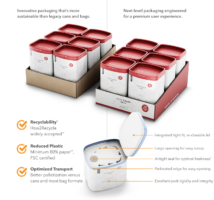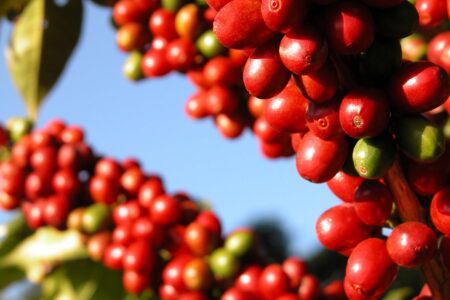Coffee and tea industries transition to more sustainable packaging

Image: Nestlé
As consumers and legislative bodies continue to demand sustainability, producers of tea and coffee products are changing how they run their businesses to reduce their carbon footprint and promote circularity. One common strategy involves transitioning to more environmentally friendly packaging materials. This begins with eco-design and continues on the packaging line and through the supply chain to the consumer and ultimate disposal.
Packaging changes may involve adopting materials that are recyclable, compostable, and source-reduced/lightweight, based on renewable sources, and/or made with recycled content. There also are efforts to reduce the use of plastics, especially single-use plastics and plastics that aren’t likely to be recycled.
Compostable packaging is expected to be one of the fastest-growing formats, according to the Packaging Compass report and infographic, produced by PMMI, The Association for Packaging and Processing Technologies, and AMERIPEN. Compostable packaging has made significant inroads for tea and coffee products that rely on pods or capsules and has diverted millions of spent units from landfills. Some roasters offer compostable pods or capsules, including Nespresso and two Canada-based firms, Club Coffee and Neighbourhood Coffee Company.

Image: Mother Parkers Tea & Coffee
A new pod option, expected to be certified as backyard compostable, is being developed by Keurig Dr Pepper (KDP). The K-Rounds plastic- and aluminium-free, pressed-coffee pod will be available in different sizes and marked with a code that the Keurig Alta brewer automatically reads to determine the pressure and extraction profile needed for the coffee beverage being brewed. A proprietary, plant-based coating preserves the coffee’s flavour and aroma and the puck-like shape of the pod. The product is moving through beta testing to determine what shelf life is needed and to balance barrier properties between the K-Round pod and its secondary packaging, which will be recyclable.
Moving to multi-serving products, some plastic-based packaging is being replaced by paper-based options. For example, Club Coffee packages ground and whole bean coffee in canisters formed from flat paperboard/foil laminate blanks, even though it necessitated installing new equipment on two lines, one for smaller canisters holding less than 450 grams (15.9 ounces) and one for larger sizes.
Made of renewable fiber from sustainably managed forests, certified by the Forest Stewardship Council, the canisters are classified as “widely recyclable” by the How2Recycle labelling programme. This means the canister is acceptable in at least 60 percent of curbside recycling programmes in the US and Canada. Canisters also feature a one-way degassing valve, easy-peel membrane, and induction-sealed base. A patented, built-in, hinged reclose feature preserves freshness at least as well as steel cans with plastic snap-on lids.
According to Club Coffee, the paperboard canister releases 91 percent less carbon into the atmosphere per year compared to steel cans. It also reduces the use of plastic by 50 percent compared to bags, and by 43 percent compared to injection-molded plastic cans. In addition, transport emissions are 90 percent lower than with traditional metal or plastic cans since the paperboard canisters are shipped flat and erected on-site. The canister package has been well-received by consumers and won in the Product Innovation Category in the 2023 Reuters Responsible Business Awards.
Another Canada-based firm, Mother Parkers Tea & Coffee, relies on the same in-house canister-forming technology and has achieved similar results. Offered in sizes from 10 to 48 ounces, the paperboard-based canister reduces inbound shipping to three trucks versus 56 trucks for pre-formed cans. It also cuts plastic use by at least 50 percent, compared to the bag format it replaces. The company is expanding its use of the format and expects equipment being installed at its operation in Fort Worth, Texas, to be running before the end of 2024. “Our new packaging solution is a win for the planet, for our customers and their consumers,” said Kim Cunningham, chief commercial officer at Mother Parkers. “It offers a recyclable packaging option with less plastic, without sacrificing any of the freshness, consistency, or quality that Mother Parkers-produced coffee is known for. For retailers with private-label coffee programmes, it’s a way to show innovation, gain share, and drive shelf and transportation efficiencies, all while supporting their sustainability objectives.”
Refill/reuse is the sustainability tactic chosen by Nestlé UK & Ireland, which now offers a resealable refill pouch for Nescafé Gold Blend and Nescafé Original instant coffees. Once emptied, pouches can be dropped off at more than 5,000 stores across the UK and are accepted by curbside recycling programmes in Ireland. Compared to existing 200-gram glass jars, the refill pouch costs less and is 97 percent lighter. It also contains roughly 60 percent less plastic than the glass jar’s lid. Prominent, front-panel graphics encourage consumers to “Refill your jar and recycle me.”
Someday, it might be possible to make biodegradable coffee packaging from coffee grounds. Research by Srinivas Janaswamy, an associate professor at South Dakota State University, indicates the lignocellulosic fibers in coffee grounds can be extracted and processed to produce films that biodegrade within 45 days in soil, possess high tensile strength, and offer barrier properties to ultraviolet radiation and oxygen.
- Tom Egan serves as the vice president of Industry Services for PMMI, the Association for Packaging and Processing Technologies. He joined the PMMI staff in 2003 following more than 20 years in the packaging industry during which he was also an active PMMI member. Egan’s previous work experience includes tenures at Eaton Corporation, and as vp, marketing & sales, for Hoppmann Corp. He has an MBA from Baldwin-Wallace College, and a BEE in Electrical Engineering from Villanova University. The latest sustainability solutions will be on display at PACK EXPO International (3 – 6 November 2024, Chicago, Illinois).



